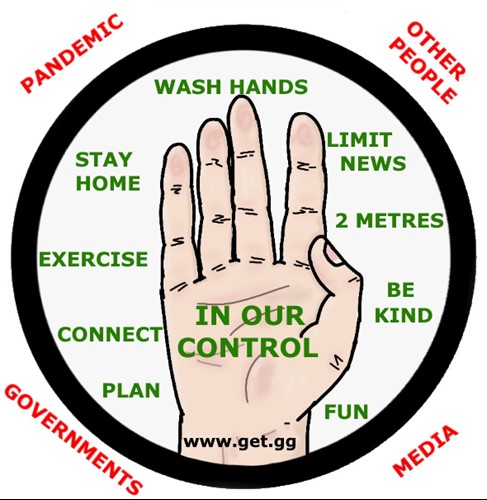Maintaining Mental Health and Wellbeing in the Coronavirus pandemic
We can control some aspects of our lives, but many things are outside of our control, particularly in extraordinary times of a pandemic, such as the coronavirus crisis of 2020-2021.
We cannot control the virus itself, but we can take steps to reduce our risk.
We cannot control other people's actions, but there are things we can do to protect ourselves.
We cannot control the media or the amount of coverage given to the pandemic, but we can control how much we watch or pay attention to.
We cannot control governments, but we can choose to listen and adhere to the evidence-based advice given.
There is still much we CAN do to help maintain and improve our own mental health and wellbeing.

(Art by Alice Vivyan)
Stay Home Self Help Pack from NHS Birmingham & Solihull (Getselfhelp.co.uk resources)
We must follow local Government advice at this time. This includes washing our hands and staying at home (and strict social distancing if essential that we go out). Gov.uk - Gov.gg - WHO
- Wash your hands - for 20 seconds in soap and warm water. See this video.
- Avoid touching your face.
- Catch coughs and colds in a tissue or the bend of your elbow.
- Keep a distance of at least 2 metres from others.
- Stay home as much as you can (all the time if self-isolating), only going out for ESSENTIAL: medical appointments or pharmacy or grocery shopping.
This, of course, can be difficult for us to deal with, feeling cut off from loved ones, and the added stress of managing a family and household when schools and universities are closed, and our work and financial situation becomes very challenging. This can greatly impact on our mental health and wellbeing. It is therefore important to:
Look after your body: Exercise daily, eat healthily, drink plenty of water, schedule rest times. See BACES
Maintain a routine: Get up and go to bed at the same times every day. Make a daily schedule for work or study, share the chores, meals, fun and relaxation, connecting with others. Use a weekly planner.
Write down the activities which energise and uplift you, and those which calm and relax you. Schedule at least one each into your day.
Plan fun and enjoyment: whatever works for you. If you enjoy reading, most local libraries offer free loans of audio and e-books. Check your local library website. Amazon offers free Kindle e-books and Audible is also offering many free audiobooks. Listen to music - or play/learn an instrument. Watch films or box sets on TV or via online streaming services. Play board games or complete a jigsaw puzzle. Participate in a quiz. ChatterPack ideas
Do something you've been meaning to do: declutter the house, up-cycle a piece of furniture, tidy the garden or shed.
Be creative: paint, draw, compose, write a poem or short story, write a novel, keep an isolation journal including things to be grateful for, build a boat or space-ship out of recycling materials, invent something.
Connect with others: Keep in touch with family or friends, or contact someone you haven't heard from in a long time. Phone a friend, video call family, use social media wisely. If you feel totally alone, then call a national helpline such as SupportLine and others here, or via a website such as Web of Loneliness.
Limit news and social media: too much can make us feel anxious, sad or angry. Keep up with new Government advice and local news once or twice a day, but don't listen to or watch the news or social media all day! Use ONLY safe sources, e.g. Gov.uk - Gov.gg - WHO - NHS - 111 NHS - BBC
Be kind: local volunteer groups are appearing everywhere. Search online (e.g. Facebook groups) to join. If you have vulnerable neighbours and you're not self-isolating, let them know you can help out and give them your telephone number.
Ask for help: if you're vulnerable, needing to self-isolate, or locked-down and you don't have friends or family to help, make contact with a local volunteer group by searching online (e.g. Facebook groups) or ask your local library, citizens advice bureau or council. Most people are keen to help at this time, so please ask. Some communities have set up their own ways of asking for help.
Mental Health support: Contact your GP or local MIND or other local group for advice, or call the Samaritans. Follow the self-help information and guides in the links below.
Coping with Anxiety (See this video from The Guardian) It is entirely normal and appropriate to be somewhat anxious about the novel coronavirus and Covid-19. We are all worried and anxious, and it is right that we are. The worrying thoughts and uncomfortable feelings will help remind us to follow our government's advice to help protect us and our loved ones. However, sometimes the anxiety feels overwhelming, but we can use self help techniques to help us cope with the anxious thoughts and feelings.
Stay Home Self Help Pack from NHS Birmingham & Solihull (Getselfhelp.co.uk resources)
Self Help - many suggestions to help you cope with anxiety etc.
Self Help Guides For Problems such as anxiety, depression and stress
Mental Health First Aid Box / Soothe
Other websites:
NHS - 10 Tips to help if you are worried about coronavirus
Young Minds for children and young people
VeryWellMind for adults
BBC How to protect your mental health - APPLE from getselfhelp not Anxiety UK :-)






















